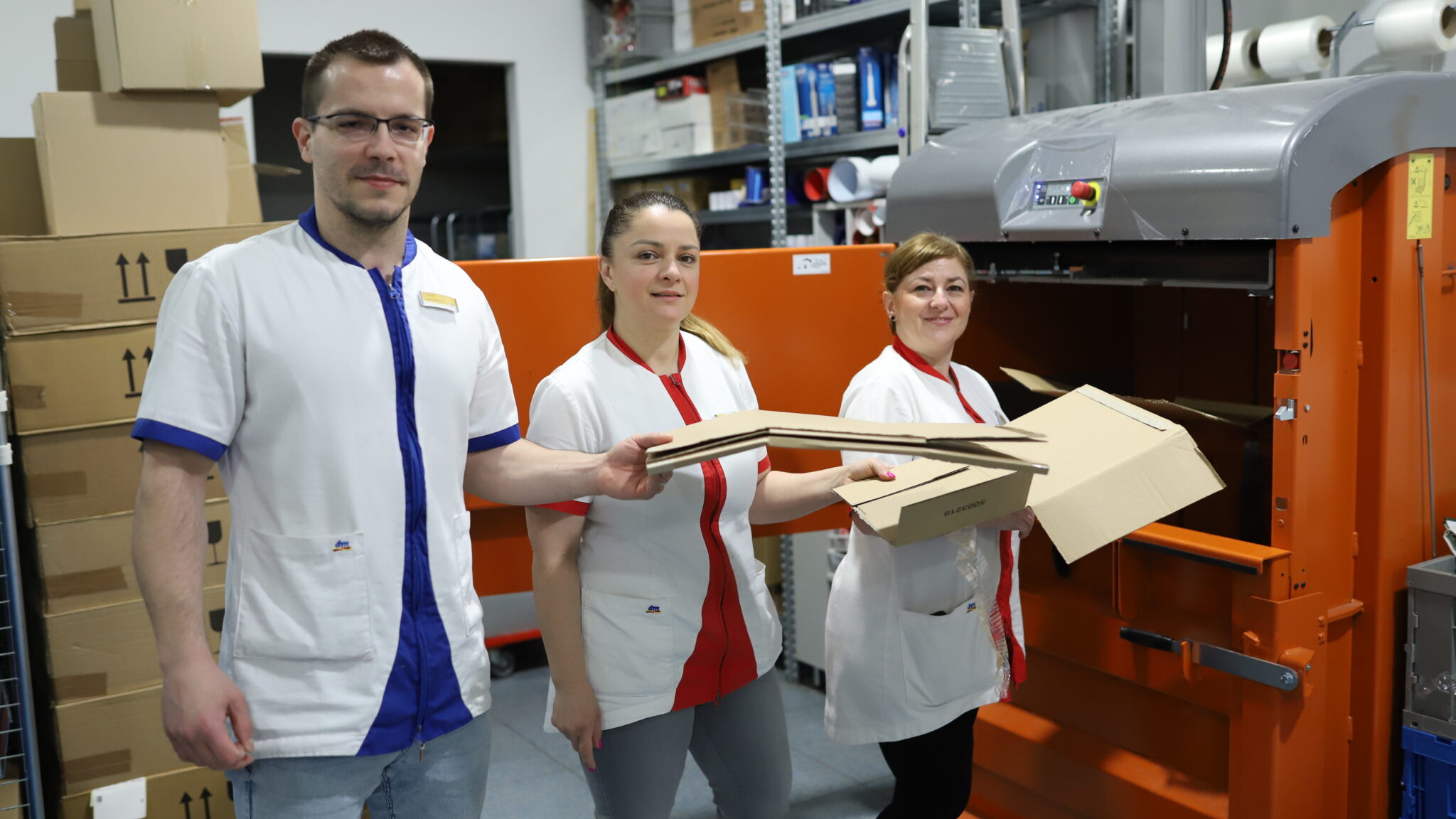dm is the leading drug store chain in Croatia with 174 stores throughout the country covering both the mainland and the islands. The dm stores daily collect large quantities of recyclables such as cardboard boxes and plastic foil. In the last three years, dm invested in a more sustainable business by installing 130 Orwak balers in its stores for compacting recyclable materials.
Interzero, Orwak’s distributor in Croatia, provided expertise on compaction solutions and delivered the balers. dm made the selection of balers based on analysis of the amount of waste and the size of each store.
Small balers, big advantages
One of the selected balers is model 3120, “the largest of the smallest” baler in the Orwak Compact range. It makes bales of cardboard and foil weighing up to 130 kg. Compared with balers from other manufacturers, the 3120 is the only baler in this size and capacity range that comes with a single-phase connection, which is an advantage and makes the baler easier to place in any store environment. The bales are just the right size for a euro pallet and the bale is easily ejected by pushing two buttons. It means that the employees can work more efficiently, the store space is used more productively and is kept clean and optimized.
“We are happy that dm recognized our balers as the means to achieve a more sustainable and safer working process in theirs stores” says Vanja Horvat, director of the SEE region at Interzero.
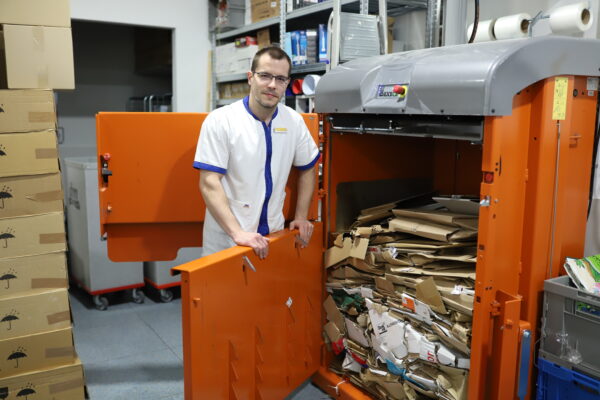
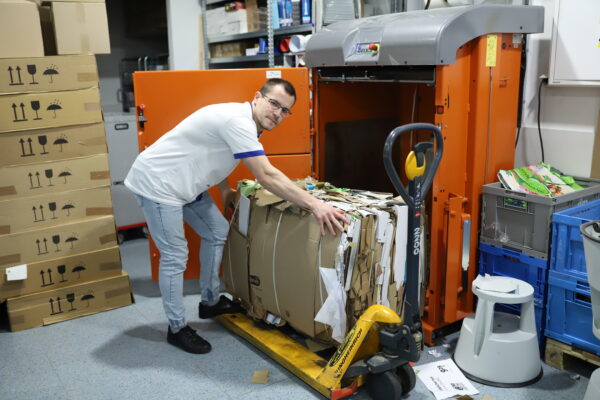
Financial savings, better working environment and a more sustainable business
Another selected baler for smaller dm stores is Orwak 3115. This baler is from the same Compact range but smaller and provides cross-binding of the bales as a special feature. Vertical balers present many user advantages over traditional bins and containers. First of all, compacting cardboard and plastic foil reduces the volume by up to 90 %, which saves floor space and transportation. It makes the employees’ work easier when manual cutting and folding and stacking material is no longer necessary as the balers compact all types of cardboard boxes in the stores. Ana-Marija Vitko, branch logistics manager at dm, comments:
“By introducing balers into the existing waste management and recycling of cardboard packaging and plastic foil we have achieved a more efficient system of packaging collection and recycling. Furthermore, we reduced CO2 emissions by canceling the local collection of cardboard packaging because we are now using existing transports to the distribution center. We also achieved financial savings in terms of lower waste collection costs due to the compacted waste.”
Ana-Marija Vitko continues: “The selected balers Orwak 3115 and 3120 are optimal for our employees and we benefit from more orderly and more productively used storage space in dm stores. Baling cardboard packaging enables us to monitoring and managing the waste quantities, further digitizing data in the packaging disposal process and more efficiently achieving sustainable goals of development.”
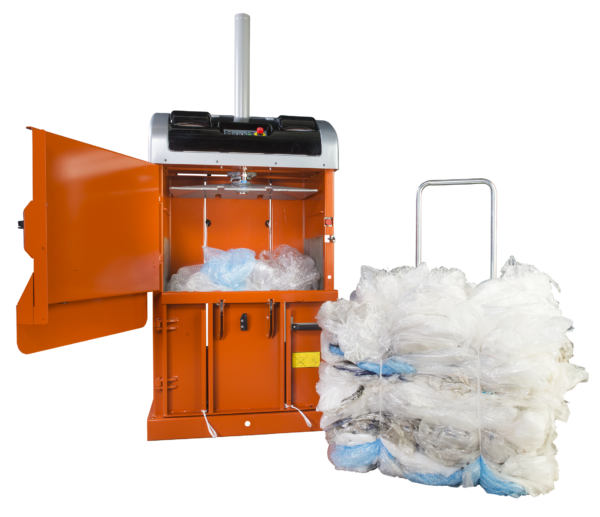
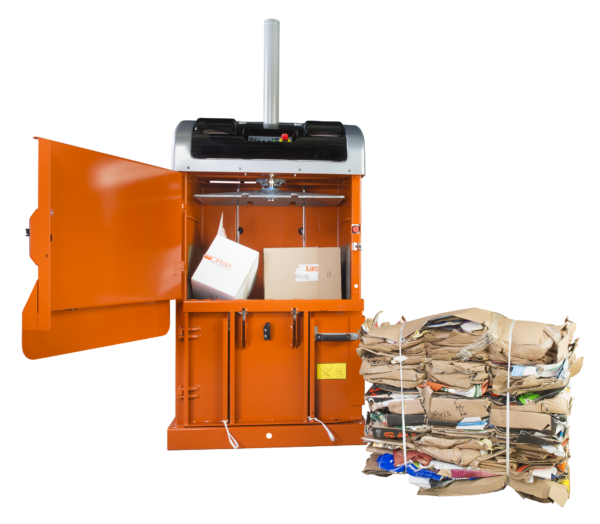
Expansion in the SEE region
Due to the cooperation with Interzero and the successful application of Orwak balers, dm expanded the use of the compaction solutions in the region. dm stores in Serbia and in Bosnia Herzegovina now also have the 3115 and 3120 balers on site, as this equipment best meets the needs in the stores in those countries.
Orwak balers are designed to be safe to use and that is one positive aspect of safety at work, but they also contribute to an improved working environment, thus the balers are installed in the warehouse eliminating the need for the staff to leave the building to walk to a container outdoors and it prevents unauthorized access to the waste management area.
Contributes to circular economy
The new waste solution brings qualitative and environmental advantages. Using one baler saves about five large waste containers. Installing balers and producing compact bales, optimizes the logistics and the collection of waste and useful recyclables. Financial savings are achieved, as well as a reduction in CO2 emission, when there is no need for individual collections of recyclables.
In addition, compact bales are easy to handle due to their shape and density and the material increases in value when delivered in clean compacted fractions. There are fewer raw materials on the market or they have become more and more expensive, but with this business model, valuable materials can go back into the loop and be used again for the production of new materials, thus achieving a circular economy. “Waste is not trash, but a secondary raw material and valuable resource.”






